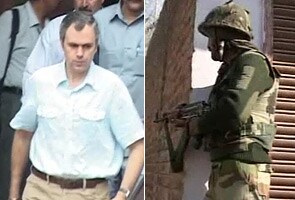
Srinagar:
After considerable controversy over its decision to revoke the Armed Forces Special Powers Act (AFSPA) from certain areas in Kashmir, the state government has reportedly decided to put the plan on hold. According to sources, the state cabinet will meet after November 10 in Jammu to take into account inputs from the Army - which is reportedly opposed to the move - as well as the Congress and other stakeholders.
But Chief Minister Omar Abdullah, in response to reports of delay in lifting of AFSPA, said that the issue had already been slated for a formal discussion on November 7 or 8 in Jammu once offices opened.
Mr Abdullah had, at a public function on November 21, said that AFSPA would be removed from some areas in Kashmir over the next few days. A stumped Defence Ministry as also the Army were reportedly opposed to the move. A series of high-level meetings on security - including on AFSPA - in Srinagar between a Central delegation and the Chief Minister as well as with other agencies ensured that the reported rift over the controversial Act hogged the headlines.
Mr Abdullah later hit a reconciliatory tone, saying that the removal of the AFSPA was "not an effort to undermine the role of the Army". In a press release issued on Wednesday, the Chief Minister said, "it is nobody's case to demonize the Army because the Army has proved time and again that it is a disciplined force."
Meanwhile, senior BJP leader Arun Jaitley today said that it would be more "politically more prudent" for Mr Abdullah to keep the move on the removal of AFSPA on hold. In his blog, he said, "The withdrawal of this law would leave the administration of the unprotected districts only in the hands of the local police and thus incentivizing the separatist and violent groups to increase their activities in these areas." He further added, "It would, therefore, be politically more prudent for the Chief Minister of Jammu and Kashmir (Omar Abdullah) not to initiate a debate at a stage when circumstances still warrant the continuation of the operation of the law (Armed Forces Special Powers Act)."
Sources have told NDTV that the Defence Ministry - on the Army's advice - is opposed to withdrawal of AFSPA even from selected areas. It, though, is agreeable to a reduction in the visibility and presence of the Army.
The opposition to lifting of AFSPA stems from concerns of the Army, which is based on intelligence inputs and intercepts that it has received in the last 2-3 months. According to its estimates that have been verified by other agencies, around 2,500 militants are present in 42 training camps in Pakistan-occupied Kashmir (Pok). Of these, 800 are poised to cross over to India. Around thirty odd militants have been killed along the Line of Control (LoC) in the last two months while attempting to cross over. Sources further say that intercepts indicate that infiltration attempts are likely to continue even during the winter months - a period when infiltration figures, otherwise, come down considerably.
But Chief Minister Omar Abdullah, in response to reports of delay in lifting of AFSPA, said that the issue had already been slated for a formal discussion on November 7 or 8 in Jammu once offices opened.
Mr Abdullah had, at a public function on November 21, said that AFSPA would be removed from some areas in Kashmir over the next few days. A stumped Defence Ministry as also the Army were reportedly opposed to the move. A series of high-level meetings on security - including on AFSPA - in Srinagar between a Central delegation and the Chief Minister as well as with other agencies ensured that the reported rift over the controversial Act hogged the headlines.
Mr Abdullah later hit a reconciliatory tone, saying that the removal of the AFSPA was "not an effort to undermine the role of the Army". In a press release issued on Wednesday, the Chief Minister said, "it is nobody's case to demonize the Army because the Army has proved time and again that it is a disciplined force."
Meanwhile, senior BJP leader Arun Jaitley today said that it would be more "politically more prudent" for Mr Abdullah to keep the move on the removal of AFSPA on hold. In his blog, he said, "The withdrawal of this law would leave the administration of the unprotected districts only in the hands of the local police and thus incentivizing the separatist and violent groups to increase their activities in these areas." He further added, "It would, therefore, be politically more prudent for the Chief Minister of Jammu and Kashmir (Omar Abdullah) not to initiate a debate at a stage when circumstances still warrant the continuation of the operation of the law (Armed Forces Special Powers Act)."
Sources have told NDTV that the Defence Ministry - on the Army's advice - is opposed to withdrawal of AFSPA even from selected areas. It, though, is agreeable to a reduction in the visibility and presence of the Army.
The opposition to lifting of AFSPA stems from concerns of the Army, which is based on intelligence inputs and intercepts that it has received in the last 2-3 months. According to its estimates that have been verified by other agencies, around 2,500 militants are present in 42 training camps in Pakistan-occupied Kashmir (Pok). Of these, 800 are poised to cross over to India. Around thirty odd militants have been killed along the Line of Control (LoC) in the last two months while attempting to cross over. Sources further say that intercepts indicate that infiltration attempts are likely to continue even during the winter months - a period when infiltration figures, otherwise, come down considerably.
Track Latest News Live on NDTV.com and get news updates from India and around the world

